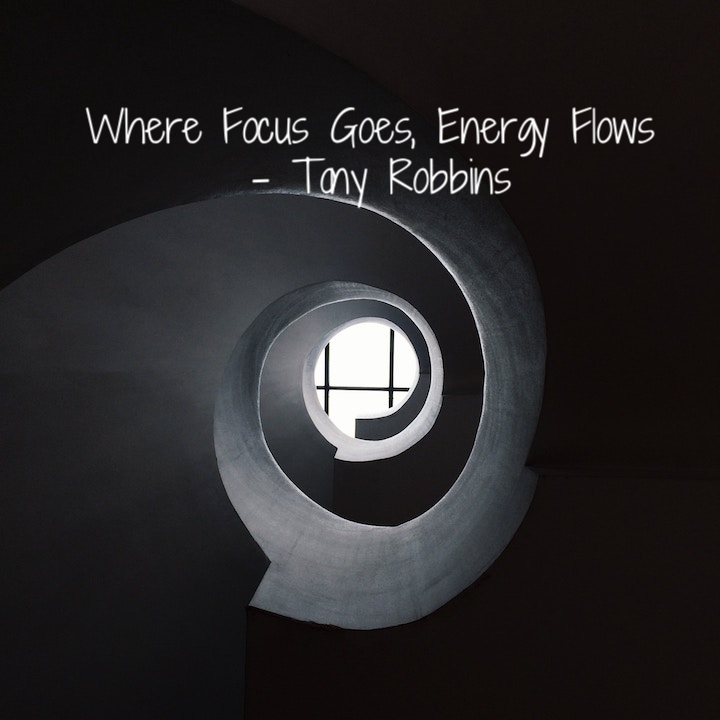Deep Work: Skyrocket Your Productivity with These 4 Recipes & 8 Tools (Infographic)
“Most people dabble their way through life, never deciding to master anything in particular. In fact, I believe most people fail in life simply because they major in minor things.”
One day in 247,982 BC a member of the species we now call Homo Sapiens sat on a rock near the watering hole. Separated from the safety of the group, he was reliving the nightmare in his head and deciding what to do next.
"Why did it go after me? Don't they prefer other, bigger prey? How do I get back to the group and not run into that mean...," he wasn't able to finish the thought and devise a sensible plan because his ears detected a new sound and as his eyes found its source fear overtook him. He took off running. The beast followed.
250,000 years of conditioning and brain-wiring later, the story above only slightly exaggerates what the modern day human must overcome to focus on things and actions that produce the best results. Just as the ancient Sapiens was forced to split his attention and always look out for dangers (predators) and opportunities (food) the modern day human is prone to distractions brought about thousands of years of habituation of fear-based and pleasure-seeking behaviors.
Our thoughts and actions are constantly interrupted. Not meaning to get distracted at work, we pay attention to stimuli that make us inefficient. In a 2016 Career Builder survey of over 3,000 full-time U.S. workers, 2 out of 3 admitted to using their smartphone several times a day while working. Interestingly, only 10% of the same individuals conceded their smartphone use decreased their productivity.
The same thing happens at home. Digital distractions repeatedly slow us down, but we're often unaware of their full impact on our ability to get things done and how they change our overall efficiency. We don't keep track and confuse being busy with being productive.
And that's just the tip of the iceberg. The same Career Builder survey named many other workplace productivity killers. The graphic below applies to at home productivity as well.
The biggest productivity killers in the workplace. Source: https://hiring-assets.careerbuilder.com/media/attachments/careerbuilder-original-2352.jpg?1465224437
The end result? Unaware, constantly-distracted individuals who don't have the skills required to dive deep into the understanding of problems and the working out of solutions. We can't focus for long enough to do deep work and don't know how to train our focus. But our success depends on sustained and smart productivity so we can achieve expertise our competition lacks. This is how deep work gets us ahead.
Become aware first. Then, take action.
The giant killer cat was getting closer. The Sapiens saw a tree. He climbed up the tree. He was safe. The angry leopard waited. The beast was hungry. The Sapiens was scared. He was hungry too but had a larger distraction to contend with at that moment.
Deep work is something we have to work for. Far from automatic, it's a skill anyone can build and get better at. As all skill-building it starts with the know how and requires thoughtful action. Planing, scheduling, dealing with distractions, tracking progress and effectiveness, and fueling you body, mind, and soul are a few microskills of the larger Deep Work Skill.
Deep work is hard but it will skyrocket your productivity and change your life.
Sign up below to receive more articles and graphics on effective learning and building skills. It's completely free and with no strings attached.
And if you're looking for some success tools check out my books on Amazon.
Hi, I'm Oskar. I teach and write about learning for success.
BLOG ARCHIVE
- December 2025 1
- September 2025 2
- August 2025 5
- July 2025 4
- June 2025 2
- August 2024 2
- July 2024 2
- June 2024 1
- October 2023 1
- September 2023 3
- August 2023 6
- July 2023 6
- July 2022 2
- June 2022 1
- November 2020 3
- October 2020 3
- April 2020 1
- March 2020 5
- July 2019 1
- June 2019 1
- April 2019 1
- January 2019 1
- November 2018 3
- October 2018 2
- September 2018 1
- August 2018 8
- July 2018 11
- June 2018 4
- May 2018 5
- April 2018 2
- March 2018 4
- February 2018 5
- January 2018 3
- December 2017 1
- November 2017 5
- October 2017 7
- September 2017 6
- August 2017 5
- July 2017 3
- June 2017 10
- May 2017 7
- April 2017 7
- March 2017 15
- February 2017 12
- January 2017 13
- December 2016 15
- November 2016 8
- October 2016 7
- September 2016 12
- August 2016 14
- July 2016 10
- June 2016 13
- May 2016 10
- April 2016 8
- March 2016 5
- February 2016 7
- January 2016 6
- December 2015 5
- November 2015 8
- October 2015 2










